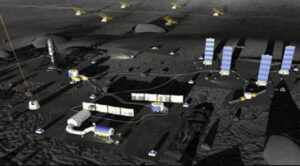China, Russia open moon base project to international partners, early details emerge
By Andrew Jones

HELSINKI — Russia and China have formally invited countries and international organizations to join the International Lunar Research Station (ILRS) project being developed by the two nations.
China National Space Administration (CNSA) and Russia’s Roscosmos said the ILRS project would be open to participation at all stages and levels. This includes planning, design, research, development, implementation and operations.
CNSA and Roscosmos will promote extensive cooperation for the development of human space science and technology and socio-economic progress, said CNSA deputy director Wu Yanhua.
The announcement was made at a sideline event of the 58th session of the Scientific and Technical Subcommittee of the United Nations’ Committee on the Peaceful Uses of Outer Space (COPUOS) April 23.
Russia and China signed a memorandum of understanding on the ILRS in March.
The development also follows Russia backing away from NASA’s Gateway project. Roscosmos also recently indicated it was considering withdrawing from the International Space Station partnership in 2025.
Early ILRS outline
The China Lunar Exploration Project under the CNSA presented early details of the ILRS project—first proposed by China as an evolutionary, expanded stage of lunar exploration following the success of a series of missions launched since 2007—at the sixth annual China Space Day in Nanjing, east China, April 24, . Slides detailing the project appeared on social media.
The first phase involves using data returned by missions sent to launch by 2025. These will determine the location for a lunar surface base in the vicinity of the lunar south pole. Missions include China’s Chang’e-6 and Chang’e-7 and Russia’s Luna 25, 26 and 27 missions.
The second phase will run from 2026-2030. It will see Chang’e-8 and Luna 28 set down at the chosen site and mark the beginning of construction.
The third phase will consist of multiple missions across 2030-2035. By this time China hopes to test launch its Long March 9 super heavy-lift launcher.
Earlier Chinese visions of the ILRS outlined long-term robotic and potentially short-term crewed missions for this timeframe. A long-term human presence at the lunar south pole is the goal for 2036-2045.
The ILRS will focus on water and mineral resources, in-situ resource utilization and manufacturing on the moon, require developing wireless energy transmission and nuclear power for space, and trialing effects of low gravity on biology, according to the China Space Day presentation
Areas of particular scientific interest include lunar geology and chemistry, the lunar space environment, moon-based astronomy, biomedicine and utilization of resources.
Upcoming missions
Chang’e-6 is a 2024 former backup to Chang’e-5 which visited Oceanus Procellarum on the near side. The new mission would target the ancient and massive South Pole-Aitken basin on the far side of the moon. The spacecraft will also carry payloads from France, Sweden, Russia and Italy.
Chang’e-7 will consist of an orbiter and a lander and deploy both a rover and a mini-flying probe. It will be supported by a relay satellite and the various spacecraft will carry a total of 23 science payloads. Objectives include a detailed survey of the environment and resources in the lunar south polar region. The mini-flying probe will make in-situ observations of a permanently shadowed crater.
Luna 25 is a Russian lander targeting a launch in October this year and landing near the lunar south pole. The mission follows 45 years after the Soviet Luna-24 mission.
China has launched two lunar orbiters, a pair of lander and rover missions and, in late 2020, the complex Chang’e-5 lunar sample return mission. It is also developing spacecraft and launch vehicles to allow crewed visits to the moon.
April 26, 2021 at 02:06PM
via SpaceNews read more...

Post a Comment